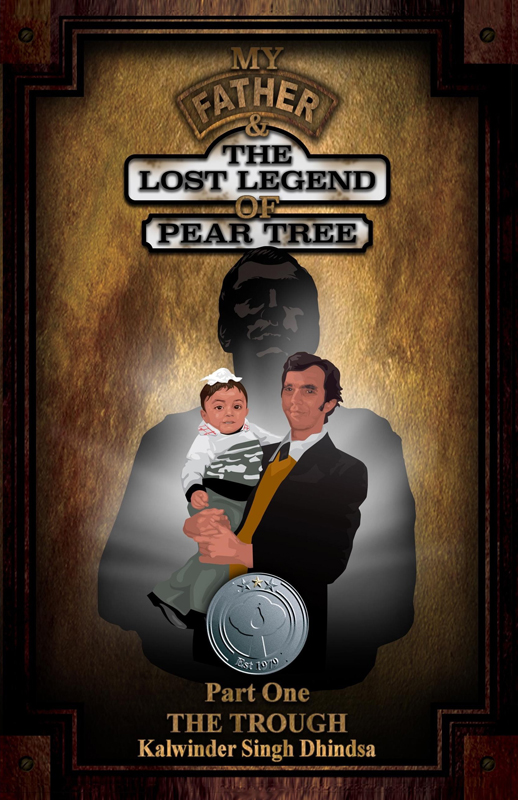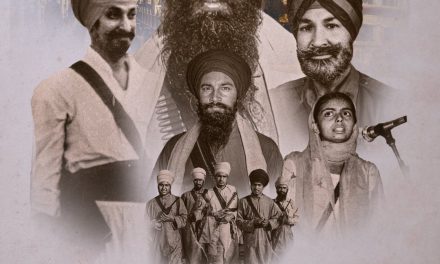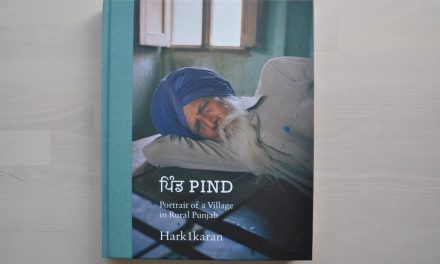When I first saw the cover to ‘My Father & The Lost Legend of Pear Tree’, I presumed it was a children’s book; perhaps an adventurous work of fiction where a top-knotted young boy plays the central role. I started to read the blurb only to quickly realise how wrong I was and now having digested the work, a closer look at the cover makes me feel all the more foolish for my initial judgement. So what lies behind the illustrious cover and engimatic title?
‘My Father & The Lost Legend of Pear Tree’ started life as a series of posts on a blog run by Derby-native Kalwinder Singh Dhindsa. Depicted as “a true story about a ‘Doctor Who’ loving Sikh Derby boy and his quest for happiness“, the story follows Dhindsa “as he comes to terms with his father’s suicide“. I say story, but the narrative consistently traverses time and space; as the reader is introduced to a particular setting, they are just as swiftly transported elsewhere at the whim of the author’s pen. For this reason the book can sometimes read like a personal journal, offering insights into some of the most personal and private experiences that Dhindsa has faced thus far, but as they are adjoined by precise observations of his surroundings, the work takes on a much broader sense of genre. This is not the kind of story that one might expect to read and whether intentionally or unintentionally, the author’s master stroke is to opt for a form of story-telling that requires alertness and thought from the reader, all the while softening the blow of the subject matter.
The focus throughout is the suicide of Dhindsa’s father. Every page draws the reader closer to the inevitable tragedy that has instigated the author to write, but with it we are given a window into the well-being of other characters, not excluding Kalwinder himself. Only when I had finished reading the book was I able to appreciate how the narrative works in the most wonderful way to alleviate the awkwardness that comes with tackling what remains one of the most sensitive subjects of our time. Suicide and the mental health of a person who contemplates it, is a topic that goes unspoken in most communities around the World, let alone amongst minority communities struggling for identity in the West. But as the reader is strewn along the author’s troublesome journey to becoming a school Science teacher and trailing in his intricate knowledge of the Pear Tree suburb of Derby, the reasons for his father’s decline and suicide are laid bare with both care and respect. If South Asians living in 21st Century Britain need an introduction to talk more openly about mental health and suicide, this book is it.
Kalvinder Singh Dhindsa is a school teacher who has used his summer holidays and spare time to author this, his first book. Looking in, you’d be forgiven for assuming that this undertaking was a form of therapy for Dhindsa, but this is somewhat unfair to the talent he displays in writing. He provides an overwhelming amount of detail when recalling people, places and occasions, which can occasionally appear mundane, but the format of his writing means that you aren’t kept in any one memory for long enough to stop you reading.
I have to confess that I was looking forward to exploring this book to see how it tackled the taboo topic of mental health in the South Asian community, particularly amongst men – which from the preceding paragraphs you will have seen I think it does extremely well. But what kept me turning each page was the deeper story being told here about identity and the migrant experience. Dhindsa brings together the muddied world that is life for the offspring of Punjabi migrants – marrying ‘home’ that is now his UK residence with the ‘home’ that was left behind in Punjab, both traversed through the traditions of the Sikh way of life. In this regard it is a must-read for UK citizens of Punjabi origin, throwing up a mirror for us to reflect on our own journey. I would even go as far as to say that it was an entertaining read, which might appear unkempt for a book on this subject matter, but is not at all untrue. I found myself teary-eyed and chuckling in equal measure, and despite being very different to the author in a number of ways, it was the similarity of our search for meaning that will have me reaching to read this book again.
‘My Father & The Lost Legend of Pear Tree – Part One’ by Kalwinder Singh Dhindsa can be bought at Amazon.







